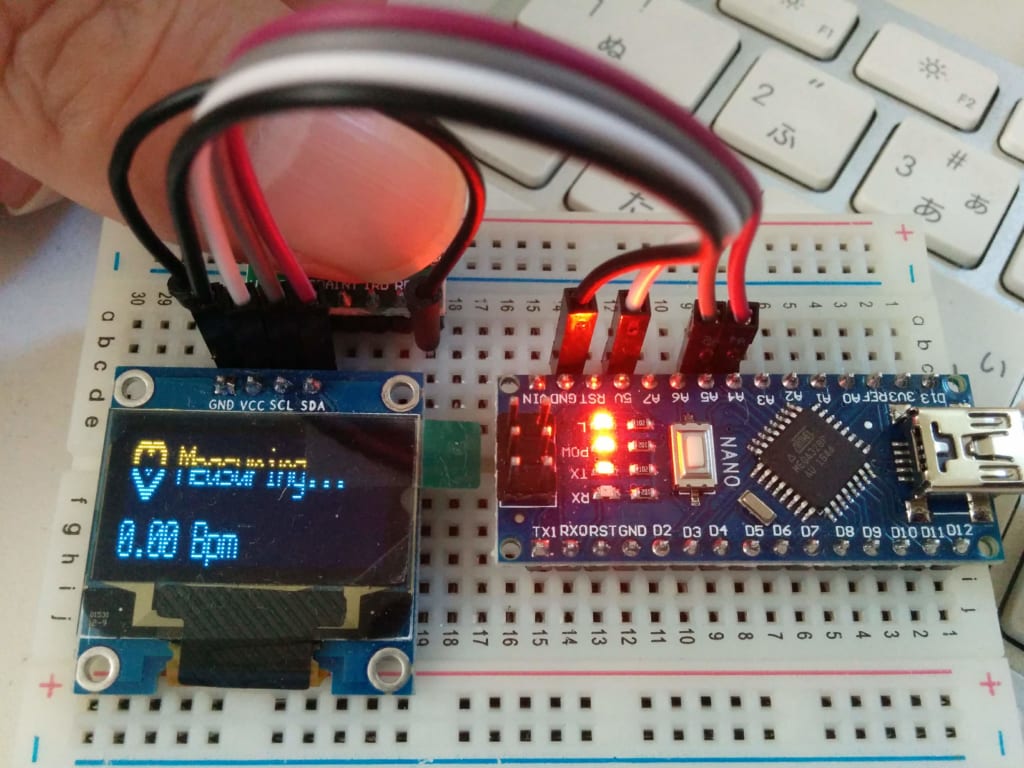試み
MAX30102 というPulse Ox Sensorを利用して、脈拍と酸素濃度を測る試み。
MAX30100の実例が多いが、MAX30102の実例が少ない。
プログラム
「参考1」のSparkFunのライブラリを利用する。そのライブラリはMAX30105(R,G,IR LED)用だが、MAX30102(欠Green LED)でも利用できる。
OLED表示するため、「参考2」の表示部分を合体した。なんとなく、バグがある様な気がする。
// Sample implementation of the MAX30100 PulseOximeter
// Using the following module
// http://www.ebay.com/itm/-/391709438817?ssPageName=STRK:MESE:IT
// can not gaurantee if the app will work with other implementations of the module.
//#include "MAX30100_PulseOximeter.h"
#include <U8g2lib.h>
#include <Wire.h>
#include "MAX30105.h"
#include "heartRate.h"
#define REPORTING_PERIOD_MS 500
U8G2_SSD1306_128X32_UNIVISION_F_HW_I2C u8g2(U8G2_R0);
// PulseOximeter is the higher level interface to the sensor
// it offers:
// * beat detection reporting
// * heart rate calculation
// * SpO2 (oxidation level) calculation
//PulseOximeter pox;
MAX30105 particleSensor;
const byte RATE_SIZE = 4; //Increase this for more averaging. 4 is good.
byte rates[RATE_SIZE]; //Array of heart rates
byte rateSpot = 0;
long lastBeat = 0; //Time at which the last beat occurred
float beatsPerMinute;
int beatAvg;
//byte pulseLED = 13; //Must be on PWM pin
//byte readLED = 11; //Blinks with each data read
//
bool calculation_complete=false;
bool calculating=false;
bool initialized=false;
byte beat=0;
void show_beat()
{
u8g2.setFont(u8g2_font_cursor_tf);
u8g2.setCursor(8,10);
if (beat==0) {
u8g2.print("_");
beat=1;
}
else
{
u8g2.print("^");
beat=0;
}
u8g2.sendBuffer();
}
void initial_display()
{
if (not initialized)
{
u8g2.clearBuffer();
show_beat();
u8g2.setCursor(24,12);
u8g2.setFont(u8g2_font_profont15_mr);
u8g2.print("Place finger");
u8g2.setCursor(0,30);
u8g2.print("on the sensor");
u8g2.sendBuffer();
initialized=true;
}
}
void display_calculating(int j)
{
if (not calculating) {
u8g2.clearBuffer();
calculating=true;
initialized=false;
}
show_beat();
u8g2.setCursor(24,12);
u8g2.setFont(u8g2_font_profont15_mr);
u8g2.print("Measuring...");
u8g2.setCursor(0,30);
u8g2.print(beatsPerMinute);
u8g2.print(" Bpm");
u8g2.sendBuffer();
}
void display_values()
{
u8g2.clearBuffer();
u8g2.setFont(u8g2_font_profont15_mr);
u8g2.setCursor(0,30);
u8g2.print(beatsPerMinute);
u8g2.print(" Bpm _ ");
u8g2.setCursor(65,30);
u8g2.print(beatAvg);
u8g2.sendBuffer();
}
void setup()
{
Serial.begin(115200);
// pinMode(pulseLED, OUTPUT);
// pinMode(readLED, OUTPUT);
u8g2.begin();
// Initialize sensor
if (!particleSensor.begin(Wire, I2C_SPEED_FAST)) //Use default I2C port, 400kHz speed
{
Serial.println(F("MAX30105 was not found. Please check wiring/power."));
while (1);
}
particleSensor.setup(); //Configure sensor with default settings
particleSensor.setPulseAmplitudeRed(0x0A); //Turn Red LED to low to indicate sensor is running
particleSensor.setPulseAmplitudeGreen(0); //Turn off Green LED
initial_display();
}
void loop()
{
long irValue = particleSensor.getIR();
float temperature = particleSensor.readTemperature();
// digitalWrite(readLED, !digitalRead(readLED)); //Blink onboard LED with every data read
if (checkForBeat(irValue) == true)
{
calculation_complete=true;
calculating=false;
initialized=false;
// digitalWrite(pulseLED, !digitalRead(pulseLED)); //Blink onboard LED with every Beat
//We sensed a beat!
long delta = millis() - lastBeat;
lastBeat = millis();
if (delta < 10000) {
beatsPerMinute = 60 / (delta / 1000.0);
} else {
calculation_complete=false;
beatsPerMinute=0;
initial_display();
}
if (beatsPerMinute < 255 && beatsPerMinute > 20)
{
rates[rateSpot++] = (byte)beatsPerMinute; //Store this reading in the array
rateSpot %= RATE_SIZE; //Wrap variable
//Take average of readings
beatAvg = 0;
for (byte x = 0 ; x < RATE_SIZE ; x++)
beatAvg += rates[x];
beatAvg /= RATE_SIZE;
display_values();
}
} else {
if (irValue < 50000) {
calculating=false;
initial_display();
} else {
display_calculating(5);
}
}
Serial.print("IR=");
Serial.print(irValue);
Serial.print(", BPM=");
Serial.print(beatsPerMinute);
Serial.print(", Avg BPM=");
Serial.print(beatAvg);
Serial.print(", initialized=");
Serial.print(initialized);
Serial.print(", calculating=");
Serial.print(calculating);
Serial.print(", calculation_complete=");
Serial.print(calculation_complete);
Serial.println();
}
実験
かなり不安定の感じがする。
一応、形はできたが、
しかし、脈拍捉えるのは稀て、今回も失敗して。。。
参考
- https://learn.sparkfun.com/tutorials/max30105-particle-and-pulse-ox-sensor-hookup-guide
- https://www.hackster.io/umar-sear/arduino-heart-rate-monitor-a8e9e1
- https://www.hackster.io/AAKS/max30100-and-blynk-0f58f4

